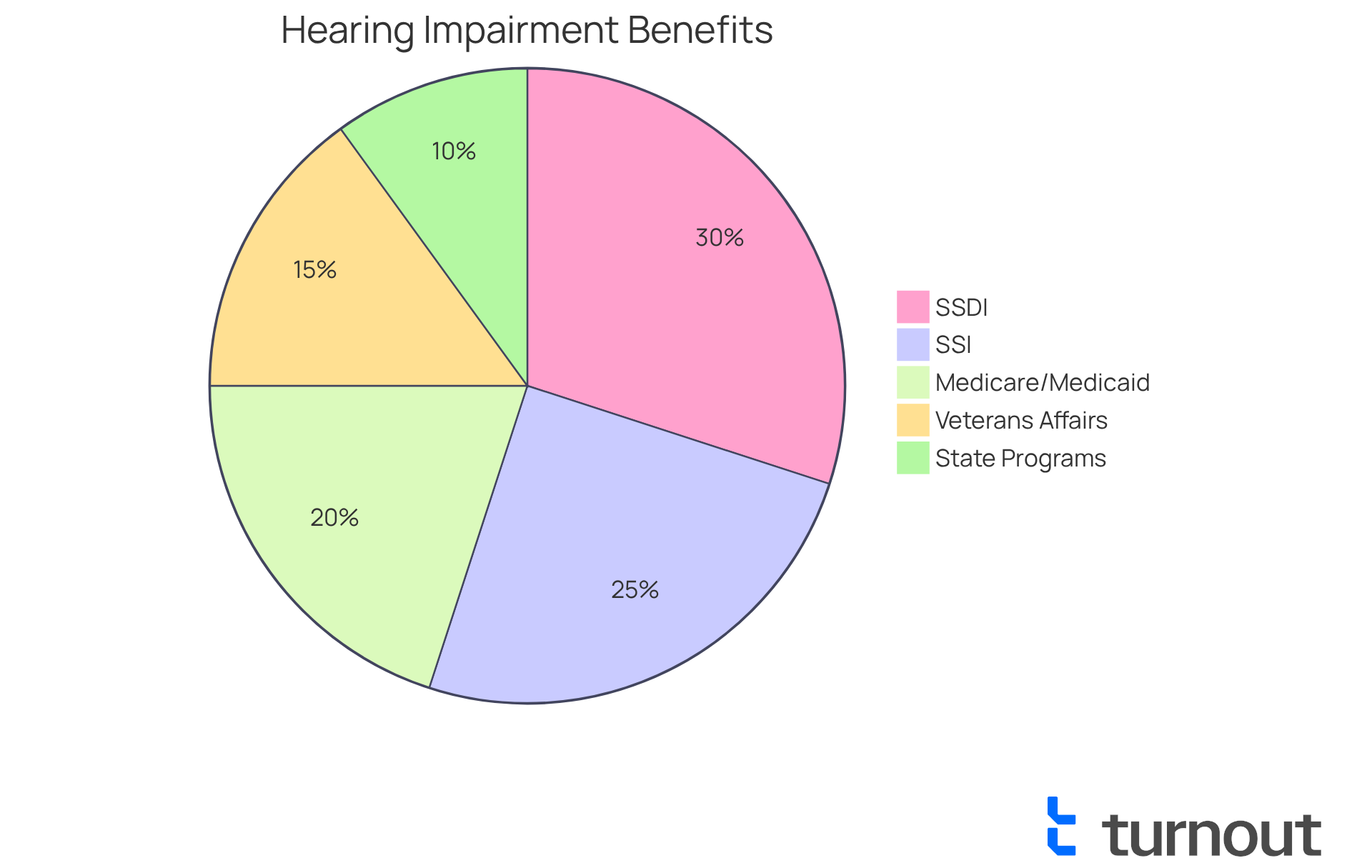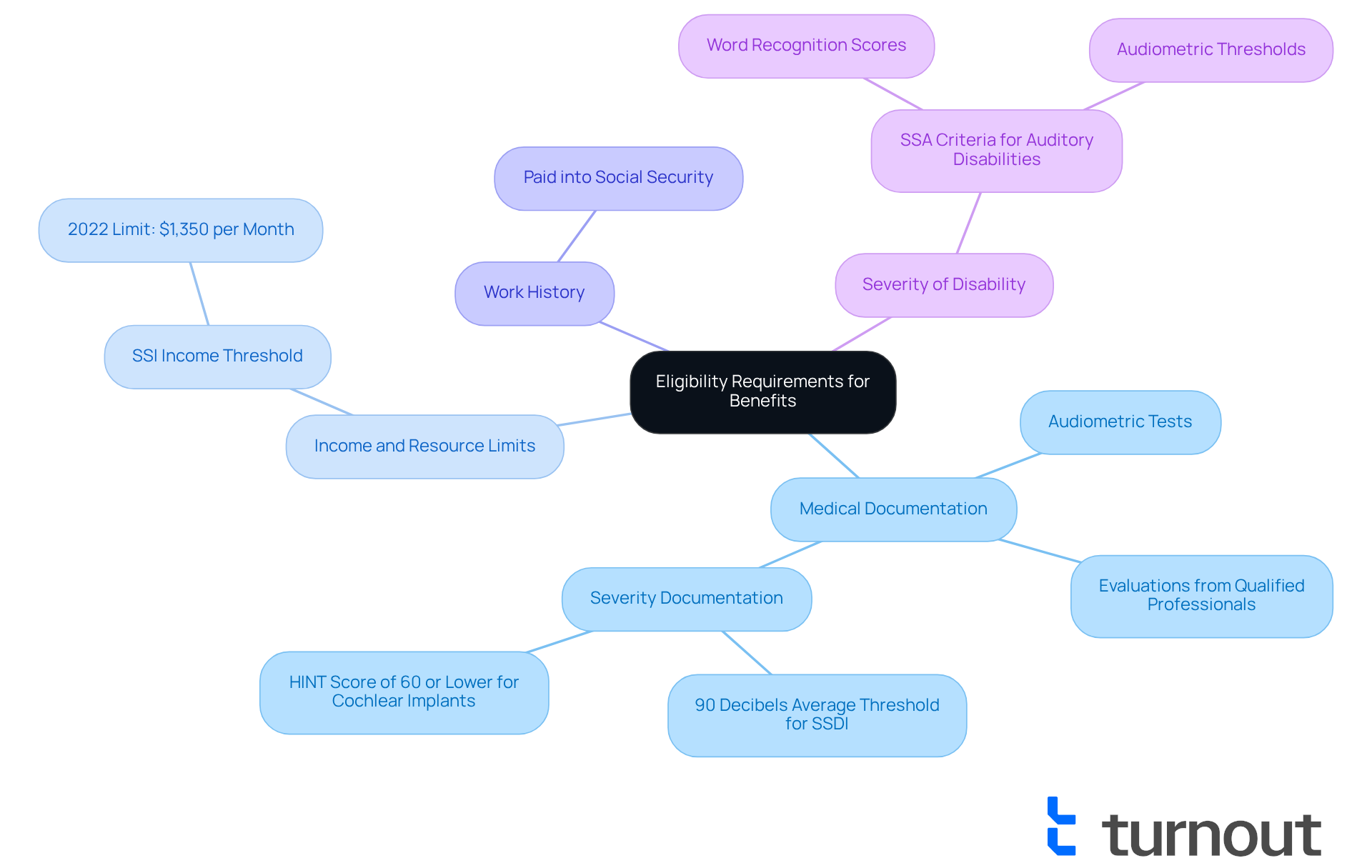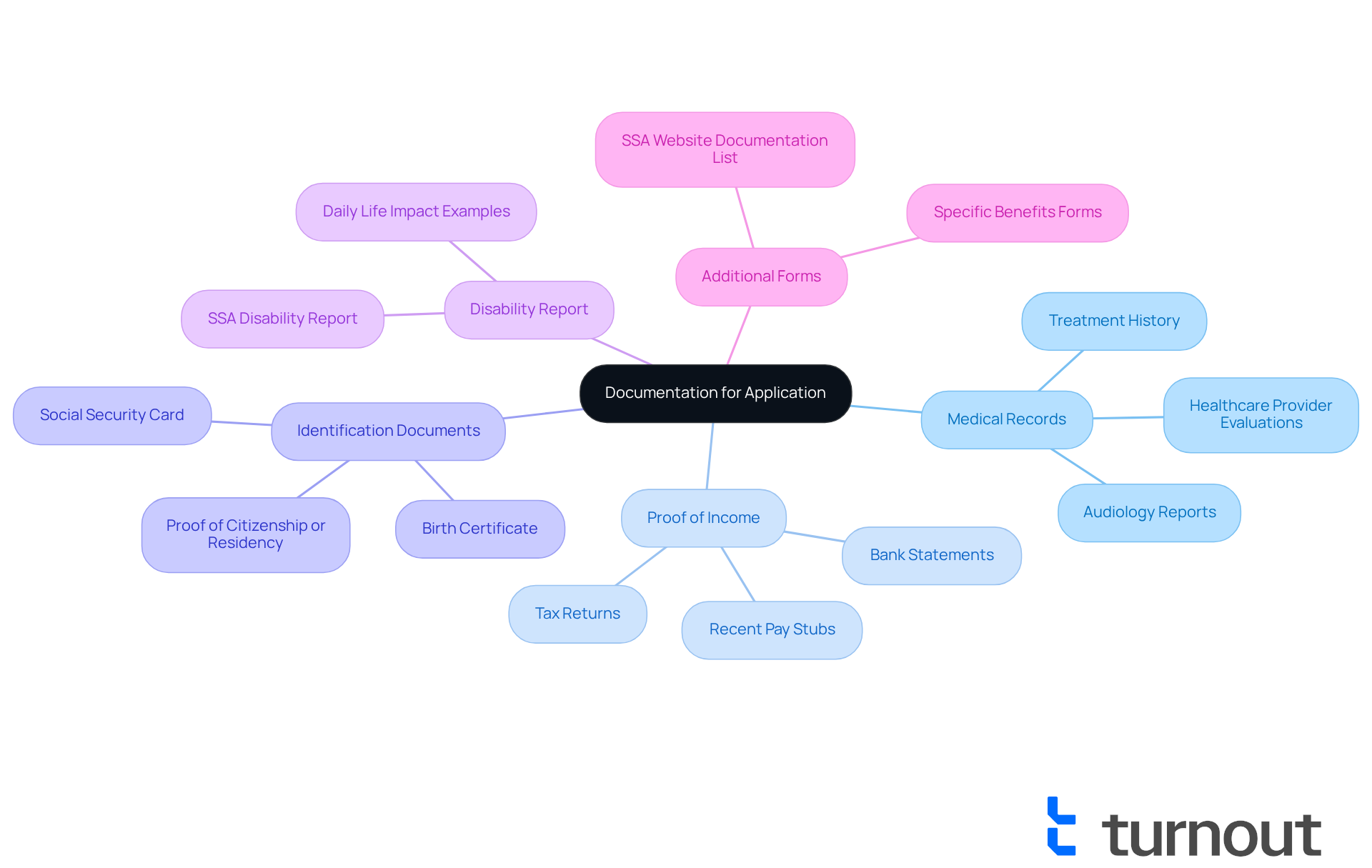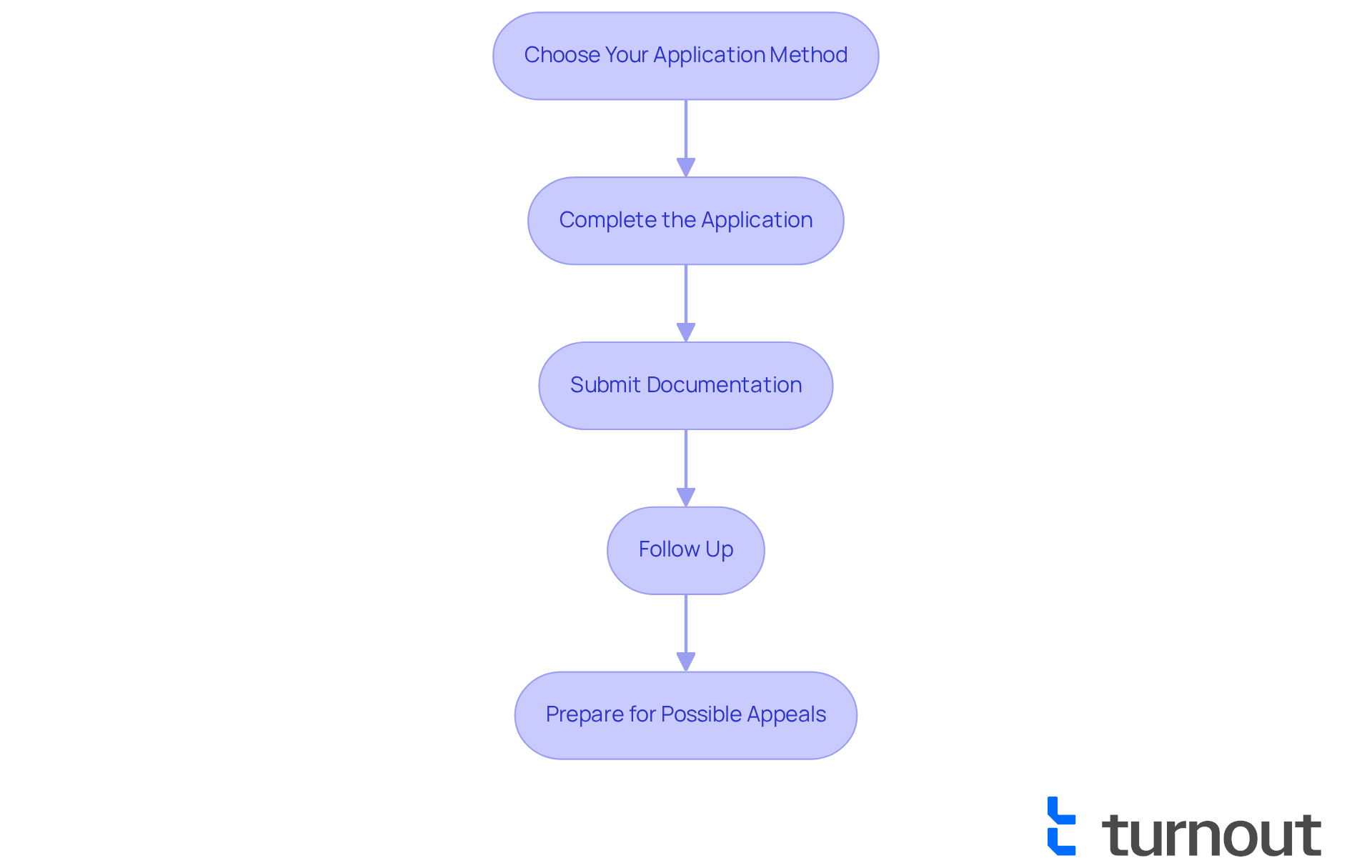Overview
Navigating government benefits can be challenging, especially for individuals with hearing impairments. This article offers a comprehensive step-by-step guide to help you understand the available programs, such as SSDI, SSI, Medicare, and state-specific resources. We understand that the process can feel overwhelming, but we’re here to support you.
It's important to grasp the eligibility requirements and gather the necessary documentation. Following a structured application process can significantly enhance your chances of receiving these benefits. By breaking down the steps and providing specific examples and guidelines, we aim to empower you on this journey.
Remember, you are not alone in this process. Many have successfully navigated these challenges, and with the right information and support, you can too. Take the first step today and explore the resources available to you.
Introduction
Navigating the maze of government benefits for individuals with hearing impairments can feel overwhelming. We understand that as new programs and regulations emerge each year, it can be difficult to keep track. The various forms of assistance available, from Social Security Disability Insurance to state-specific programs, can significantly impact your quality of life. However, many find themselves asking: how can you successfully maneuver through the eligibility requirements and application processes to secure the support you need?
This guide is here to help illuminate your path. We aim to provide a detailed overview of available benefits and practical steps to ensure a smoother application experience. Remember, you are not alone in this journey; we’re here to support you every step of the way.
Understand Available Government Benefits for Hearing Impairment
Government benefits for hearing impaired individuals include various programs aimed at providing financial support, healthcare coverage, and essential aid services. We understand that navigating these resources can be overwhelming, but we're here to help. Here are some key benefits available to you:
- Social Security Disability Insurance (SSDI): This program offers financial support to individuals unable to work due to severe hearing impairments. As of 2025, many people are receiving SSDI for auditory loss, reflecting the growing acknowledgment of these challenges as qualifying conditions.
- Supplemental Security Income (SSI): For those with limited income and resources, SSI provides monthly payments to help meet essential needs, ensuring that individuals with auditory impairments can access government benefits for hearing impaired to maintain a basic standard of living.
- Medicare and Medicaid: These programs may provide government benefits for hearing impaired individuals by covering auditory devices and related services, depending on eligibility. Recent legislative initiatives, such as the Medicare Hearing Aid Coverage Act of 2025, aim to broaden coverage for auditory devices and assessments, potentially enhancing access for many.
- Veterans Affairs Advantages: Veterans experiencing service-related auditory loss may qualify for additional assistance, including auditory devices and medical services, ensuring they receive the support they deserve.
- State-Specific Programs: Various states provide government benefits for hearing impaired individuals, offering extra resources and funding for auditory aids and assistive devices to improve accessibility for those with auditory challenges.
We encourage you to explore these advantages further. Visiting the Social Security Administration's website or consulting local government resources can provide you with detailed information. Remember, you are not alone in this journey, and there are resources available to support you.

Determine Eligibility Requirements for Benefits
Navigating the eligibility for government benefits for hearing impaired individuals can feel overwhelming. We understand that you may have concerns about the process. Here are some key criteria to consider:
- Medical Documentation: It’s essential to provide comprehensive medical evidence of your hearing impairment. This includes audiometric tests, evaluations from qualified professionals, and documentation that demonstrates the severity of your condition. For example, to qualify for SSDI, you must show an average hearing threshold sensitivity of 90 decibels or greater in air conduction testing.
- Income and Resource Limits: If you’re looking into programs like Supplemental Security Income (SSI), be aware that specific income and resource thresholds apply. In 2022, individuals earning more than $1,350 per month were ineligible. Understanding these limits is crucial to determining your eligibility for government benefits for hearing impaired individuals.
- Work History: For Social Security Disability Insurance (SSDI), having a sufficient work history is key. This means you’ve paid into Social Security through payroll taxes, which is essential for qualifying for assistance.
- Severity of Disability: The Social Security Administration (SSA) has specific criteria for auditory disabilities, including word recognition scores and audiometric thresholds. For instance, if you have cochlear implants, you’re automatically qualified for SSDI assistance one year after implantation if you score 60 percent or lower on the Hearing in Noise Test (HINT).
To ensure you meet these requirements, gather your relevant medical records. We encourage you to consult the SSA's Blue Book for detailed criteria. Remember, grasping these components can greatly improve your chances of a successful claim for auditory disability assistance. You are not alone in this journey; we’re here to help.

Gather Necessary Documentation for Application
Applying for government benefits for hearing impaired individuals can feel overwhelming, but you're not alone in this journey. To help you navigate this process, it's essential to gather the necessary documentation:
- Medical Records: It's important to include audiology reports, treatment history, and evaluations from healthcare providers that detail the extent of your hearing impairment. Comprehensive medical evidence is crucial for effectively documenting your disability.
- Proof of Income: Collecting recent pay stubs, tax returns, or bank statements will help demonstrate your financial situation, which is vital for determining your eligibility.
- Identification Documents: You will need to provide a birth certificate, Social Security card, and proof of U.S. citizenship or legal residency to verify your identity.
- Disability Report: Completing the SSA's disability report is essential. This report should detail how your hearing impairment affects your daily life and ability to work, including specific examples of limitations.
- Additional Forms: Depending on the specific benefits you are applying for, you may need extra forms. It's advisable to check the SSA website for a complete list of necessary documents.
Organizing these documents in advance can facilitate a smoother application process. We understand that statistics indicate that approximately 65-70% of initial SSDI applications are denied, often due to incomplete information or insufficient medical evidence. Therefore, being thorough and proactive in gathering your documentation can significantly improve your chances of approval for government benefits for hearing impaired.
Consulting with knowledgeable professionals, such as Turnout's trained nonlawyer advocates, early in the process can also help avoid mistakes in filing and negotiating settlements. Additionally, please keep in mind that for 2025, the monthly Substantial Gainful Activity (SGA) amount is set at $1,620 for non-blind individuals and $2,700 for statutorily blind individuals. Understanding these figures is important when assessing your eligibility.
Remember, we’re here to help you every step of the way.

Navigate the Application Process for Hearing Impairment Benefits
Navigating the application process for hearing impairment benefits can feel overwhelming, but with the support of Turnout, you can approach it with confidence. Here are some steps to guide you:
- Choose Your Application Method: You have options! Whether you prefer applying online through the SSA website, by phone, or in person at your local SSA office, each method has its benefits. Many find that online applications lead to higher success rates, making it a convenient choice.
- Complete the Application: Take your time to fill out the application form accurately. It's essential to include all relevant information, particularly details about your medical condition and how it impacts your daily life and work capabilities.
- Submit Documentation: Gather and attach all necessary documentation, such as medical records, audiometric test results (including Pure Tone Audiometry and Speech or Word Recognition Tests), and proof of income. Your documentation should clearly demonstrate the severity of your auditory impairment, as this is crucial for eligibility. Remember, to qualify for assistance, your income must not exceed $1,350 per month.
- Follow Up: After submitting your application, it's important to stay informed about its status. You can check online or call the SSA to inquire about your application. Typically, you can expect a response within three to five months, so keeping track is essential.
- Prepare for Possible Appeals: If your application is denied, don't lose hope. Be ready to appeal the decision by gathering additional evidence, such as updated medical evaluations or testimonials that highlight how your hearing loss affects your daily life. Turnout is here to assist you in this process, providing guidance and support through its range of tools and services—no legal representation needed. Additionally, consider reaching out to advocacy organizations that focus on disability resources to strengthen your case.
It's important to note that Turnout is not affiliated with or endorsed by any law firm or government agency. If you have cochlear implants, rest assured that this does not disqualify you from SSDI assistance; in fact, it may improve your eligibility in certain situations. By following these steps and keeping these important factors in mind, you can enhance your chances of a successful application for government benefits. Remember, you are not alone in this journey; we are here to help you receive the support you need.

Conclusion
Navigating the complex landscape of government benefits for individuals with hearing impairments is crucial for ensuring access to essential support and resources. We understand that this journey can feel overwhelming, but rest assured, there are various programs available to help you. This article highlights initiatives like SSDI, SSI, Medicare, and state-specific options, all designed to provide financial assistance and healthcare coverage to those affected by auditory challenges. By understanding these benefits and learning how to apply effectively, you can significantly enhance your quality of life.
Key points discussed include:
- The importance of medical documentation
- Eligibility criteria based on income and work history
- The steps required to gather necessary documentation for a successful application
It’s common to feel unsure about where to start, but by familiarizing yourself with the specific requirements and processes, you can improve your chances of receiving the assistance you need. Resources like the Social Security Administration's website and advocacy organizations are here to provide valuable guidance throughout this journey.
Ultimately, the significance of these government benefits cannot be overstated. They serve as a lifeline for individuals with hearing impairments, ensuring you have access to necessary aids and support services. Remember, taking proactive steps in understanding and applying for these benefits can make a meaningful difference in your daily life. Empowerment through knowledge and action is key; the resources are available, and with the right approach, you can successfully navigate the system to secure the assistance you deserve. You are not alone in this journey, and we’re here to help you every step of the way.
Frequently Asked Questions
What government benefits are available for individuals with hearing impairment?
Government benefits for hearing impaired individuals include Social Security Disability Insurance (SSDI), Supplemental Security Income (SSI), Medicare and Medicaid, Veterans Affairs advantages, and state-specific programs.
What is Social Security Disability Insurance (SSDI)?
SSDI offers financial support to individuals unable to work due to severe hearing impairments, acknowledging auditory loss as a qualifying condition.
Who is eligible for Supplemental Security Income (SSI)?
SSI is available for individuals with limited income and resources, providing monthly payments to help meet essential needs for those with auditory impairments.
How do Medicare and Medicaid assist individuals with hearing impairment?
Medicare and Medicaid may cover auditory devices and related services, depending on eligibility. Recent initiatives aim to expand coverage for these services.
What benefits do veterans with hearing loss receive?
Veterans experiencing service-related auditory loss may qualify for additional assistance, including auditory devices and medical services through Veterans Affairs.
Are there state-specific programs for hearing impaired individuals?
Yes, various states offer programs that provide extra resources and funding for auditory aids and assistive devices to improve accessibility for those with hearing challenges.
Where can individuals find more information about these benefits?
Individuals can visit the Social Security Administration's website or consult local government resources for detailed information on available benefits.




